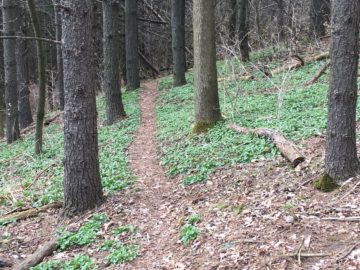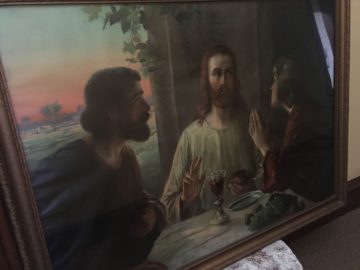We soon mark the Third Sunday of Easter. Please find a Franciscan Gospel reflection and questions written by Fr. Paul Gallagher, OFM for your prayer. They are edited by Franciscan Sister of Christian Charity Sister Anne Marie Lom and Joe Thiel. The excerpts from the Sunday readings are prepared by Joe Thiel. To read or download the complete pdf with excerpts for your prayer, please click here: Franciscan Gospel Reflection April 26 2020. Excerpts are from the Lectionary for Mass for Use in the Dioceses of the United States of America, second typical edition © 2001, 1998, 1997, 1986, 1970 Confraternity of Christian Doctrine, Inc., Washington, DC. Used with permission. All rights reserved. No portion of this text may be reproduced by any means without permission in writing from the copyright owner. Photos: Holy Family Convent, Manitowoc, Wisconsin
Luke 24:13-35
Now that very day two of them were going to a village seven miles from Jerusalem called Emmaus, and they were conversing about all the things that had occurred. And it happened that while they were conversing and debating, Jesus himself drew near and walked with them, but their eyes were prevented from recognizing him. He asked them, “What are you discussing as you walk along?” They stopped, looking downcast. One of them, named Cleopas, said to him in reply, “Are you the only visitor to Jerusalem who does not know of the things that have taken place there in these days?” And he replied to them, “What sort of things?” They said to him, “The things that happened to Jesus the Nazarene, who was a prophet mighty in deed and word before God and all the people, how our chief priests and rulers both handed him over to a sentence of death and crucified him. But we were hoping that he would be the one to redeem Israel; and besides all this, it is now the third day since this took place. Some women from our group, however, have astounded us: they were at the tomb early in the morning and did not find his body; they came back and reported that they had indeed seen a vision of angels who announced that he was alive. Then some of those with us went to the tomb and found things just as the women had described, but him they did not see.” And he said to them, “Oh, how foolish you are! How slow of heart to believe all that the prophets spoke! Was it not necessary that the Messiah should suffer these things and enter into his glory?” Then beginning with Moses and all the prophets, he interpreted to them what referred to him in all the scriptures. As they approached the village to which they were going, he gave the impression that he was going on farther. But they urged him, “Stay with us, for it is nearly evening and the day is almost over.” So he went in to stay with them. And it happened that, while he was with them at table, he took bread, said the blessing, broke it, and gave it to them. With that their eyes were opened and they recognized him, but he vanished from their sight. Then they said to each other, “Were not our hearts burning (within us) while he spoke to us on the way and opened the scriptures to us?” So they set out at once and returned to Jerusalem where they found gathered together the eleven and those with them who were saying, “The Lord has truly been raised and has appeared to Simon!” Then the two recounted what had taken place on the way and how he was made known to them in the breaking of the bread.
Background:
Perhaps this gospel text is familiar. It is one of the favorite Easter gospels of the Church. It was one of the possible texts for Easter Sunday, it was the gospel for the Wednesday after Easter, and it is used again for the Third Sunday of Easter each year.
Execution by crucifixion was reserved for the most contemptuous of criminals. The early disciples were disappointed and humiliated by the fact that Jesus was crucified. Last Sunday’s gospel also indicates that they were afraid for their own safety. It should be no surprise that some of the disciples gathered behind locked doors, and others simply fled the situation. Emmaus was a Roman spa, a place where there would be physical comfort. The two that were on the road to Emmaus were likely pilgrims who had come to Jerusalem to celebrate Passover, and they were likely on their way home. In the gospel text, they are disappointed to learn that Jesus seems to be continuing on after they reach Emmaus, but they extend to him a gesture of hospitality.
They are at some level disciples of Jesus. While they know of the events of Jesus’ Crucifixion and even the report that the grave has been found empty, they seem ignorant of the risen Jesus’ actual appearances. However, unlike the disciples who have hidden away behind a locked door out of fear, they speak openly about what has happened and of their own hopes that Jesus might be the one who would redeem Israel.
Despite the fact that they are disciples, they do not recognize Jesus, physically or theologically. Jesus brings to them a new understanding of their tradition that enables them to see how his rejection, crucifixion, and death were in accord with their scriptures. Even with that insight, they still to not recognize Jesus. It is not until the breaking of the bread that they recognize Jesus and the risen Lord. This breaking of bread is deliberately described in a way that parallels the description of the Last Supper. But as soon as they recognize him, Jesus disappears from their sight. They return immediately to Jerusalem to report their experience to the disciples, and they hear of the other experiences of the risen Lord.

Reflection Questions:
1. Where to do you go when you are stressed or disappointed? Are you more likely to be talkative or shut down internally in those situations?
2. Have there been periods in your life when you were disappointed, frustrated, or even overwhelmed with a sense that God was not present or non-responsive to you?
3. How has the pandemic, social isolation, and the way you have attended Holy Week services affected your awareness of God’s presence?
4. Luke says that Jesus drew near and walked with the two disciples, but their eyes were prevented from recognizing him. What is that saying to you about the two disciples, about God, and about us?
5. Luke reports that when the two disciples recognized him, he disappeared. How do you understand what Luke is telling those who will read his gospel?
6. Can you take some time now to talk with God honestly about whatever thoughts or feelings arose within you from this text? Or maybe you would like to talk with God about how the pandemic has disturbed your understanding of how God would be present in your world or in your life?




Article Comments:
Fr. Paul 04/26/2020 @ 3:18 pm
This gospel speaks to me of the God who walks with me on my journey. Even in those times when I am caught up doubts, fear and disappointment. God still walks with me seeking to bring me comfort as a companion. It also speaks to me of all those who are my companions now in this journey of self distancing and restricted movement. At time I am very present to my isolation.
But there are others when I realize that people all over the world are also in isolation. No matter who you are, what your status, or your country of origin, age or education, or … none of those things matter. It is in this realization that I find I am not alone but bound in common unity with all people of the world. For me that is a beautiful awareness that needs to be fostered within me.